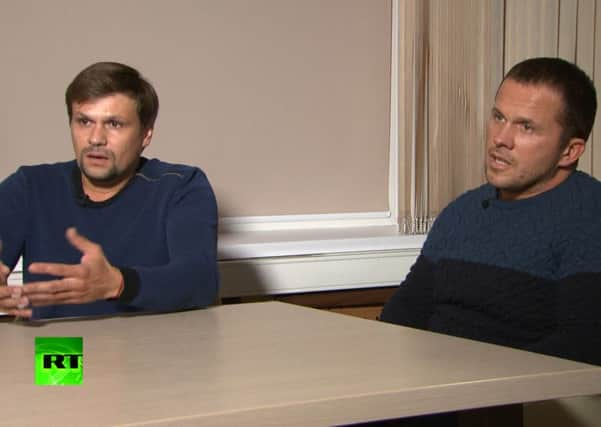Russian tourism story insults the intelligence of UK public: No 10


Men who said their names were Alexander Petrov and Ruslan Boshirov told Russian state-funded news channel RT (Russia Today) they travelled to the “wonderful” city in Wiltshire after recommendations from friends.
The pair claimed they have been left fearing for their lives after Britain pointed to their involvement and said they were officers in Russian military intelligence service the GRU.
Advertisement
Hide AdAdvertisement
Hide AdThe Prime Minister’s official spokesman said: “The lies and blatant fabrications in this interview given to a Russian-state sponsored TV station are an insult to the public’s intelligence.”
In a translation from Russian, the pair told RT editor-in-chief Margarita Simonyan they worked in the fitness industry.
The broadcaster on Thursday quoted Petrov as saying they arrived in London on March 2 and attempted to visit Salisbury on March 3 but were thwarted by snow.
They said they returned the following day when it was warmer to see the cathedral.
Advertisement
Hide AdAdvertisement
Hide AdHe said: “Of course, we went there to see Stonehenge, Old Sarum, but we couldn’t do it because there was muddy slush everywhere. The town was covered by this slush. We got wet, took the nearest train and came back (to London).”
UK authorities believe the pair smeared the chemical Novichok on a door handle at the Wiltshire home of former GRU officer Sergei Skripal, leaving him and his daughter Yulia critically ill.
Tests on the east London hotel room where the suspects had stayed showed contamination of Novichok.
Officers linked the attack to events in nearby Amesbury where Dawn Sturgess, 44, and partner Charlie Rowley, 45, were exposed to the same nerve agent.
Ms Sturgess died in hospital in July.
A police officer who visited the home of the Skripals shortly after the attack, Nick Bailey, was also left critically ill from exposure to the substance.